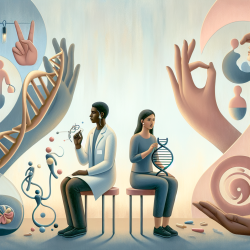The field of genetic counseling is continuously evolving, with new research shedding light on the importance of cultural sensitivity. A recent study titled Examining the Relationship Between Genetic Counselors’ Attitudes Toward Deaf People and the Genetic Counseling Session explores how genetic counselors' attitudes towards deaf individuals can significantly impact the counseling process. This research provides valuable insights for practitioners seeking to enhance their skills and foster more inclusive practices.
The Importance of Positive Attitudes
The study highlights that genetic counselors with positive attitudes towards deaf people tend to be more comfortable discussing and offering genetic testing to culturally Deaf clients. This comfort level is crucial because it influences how information is presented and can affect clients' decision-making processes. Counselors with more exposure to Deaf culture, especially those with personal or professional connections to Deaf individuals, generally exhibit more positive attitudes.
Implementing Cultural Sensitivity in Practice
To improve interactions with culturally Deaf clients, genetic counselors should consider the following strategies:
- Engage in Cultural Sensitivity Training: Participating in workshops that focus on Deaf culture can help counselors understand the values and beliefs of their clients better.
- Foster Personal Interactions: Building relationships with Deaf individuals can provide firsthand insights into their experiences and perspectives.
- Utilize Interpreters Effectively: Ensuring that interpreters are available during sessions can facilitate better communication and understanding.
- Promote Inclusivity in Educational Settings: Incorporating discussions about Deaf culture into genetic counseling training programs can prepare future counselors for diverse client interactions.
The Role of Research in Enhancing Practice
This study underscores the need for ongoing research into the dynamics between genetic counselors and culturally diverse clients. By examining real counseling sessions and gathering empirical data, practitioners can gain a deeper understanding of how attitudes influence client interactions. Such research can inform training programs and lead to more effective counseling practices.
For practitioners looking to deepen their understanding of this topic, further exploration into related studies is encouraged. Continuous learning and adaptation are key to providing compassionate and competent care to all clients.
To read the original research paper, please follow this link: Examining the Relationship Between Genetic Counselors’ Attitudes Toward Deaf People and the Genetic Counseling Session.










